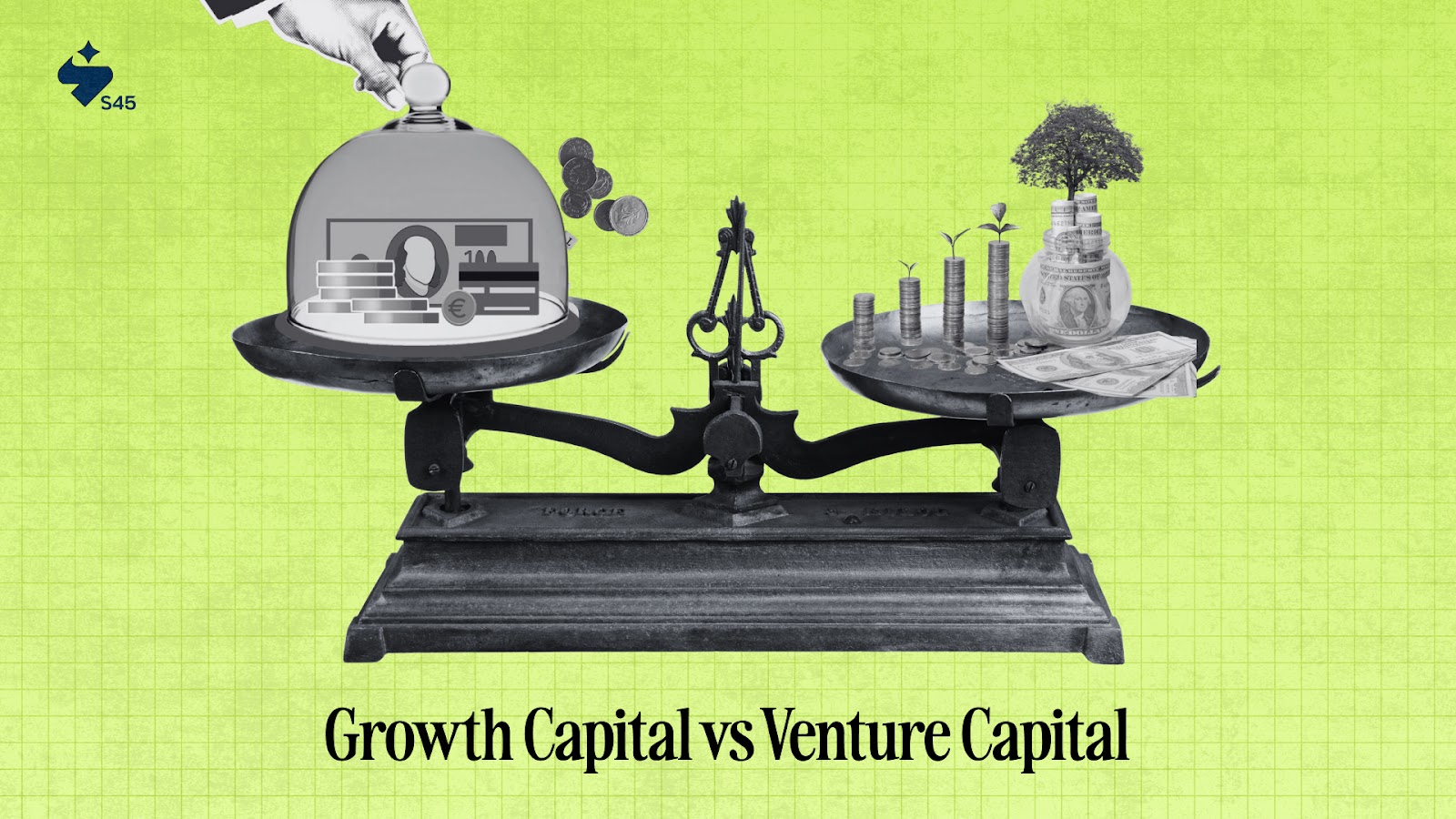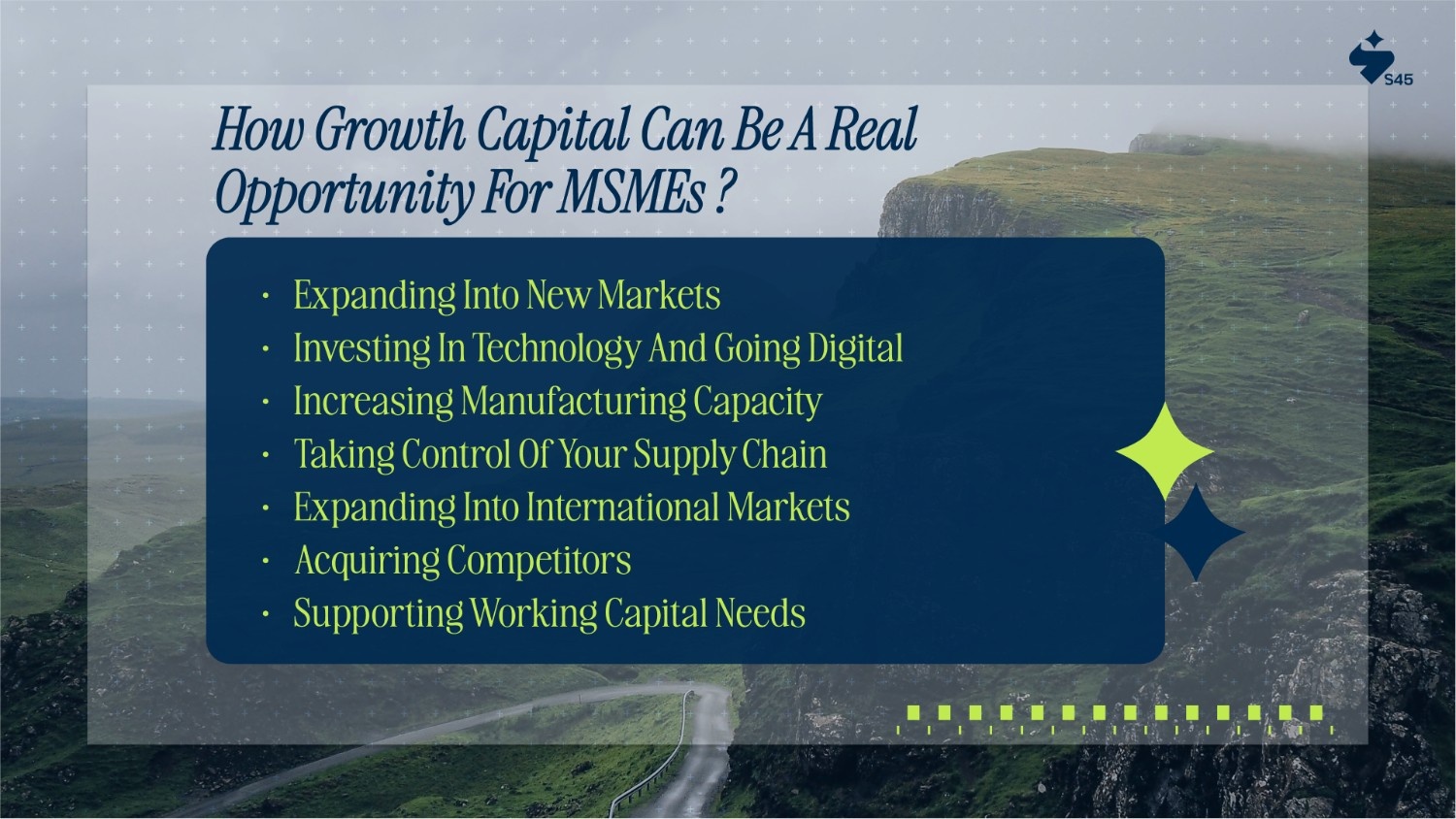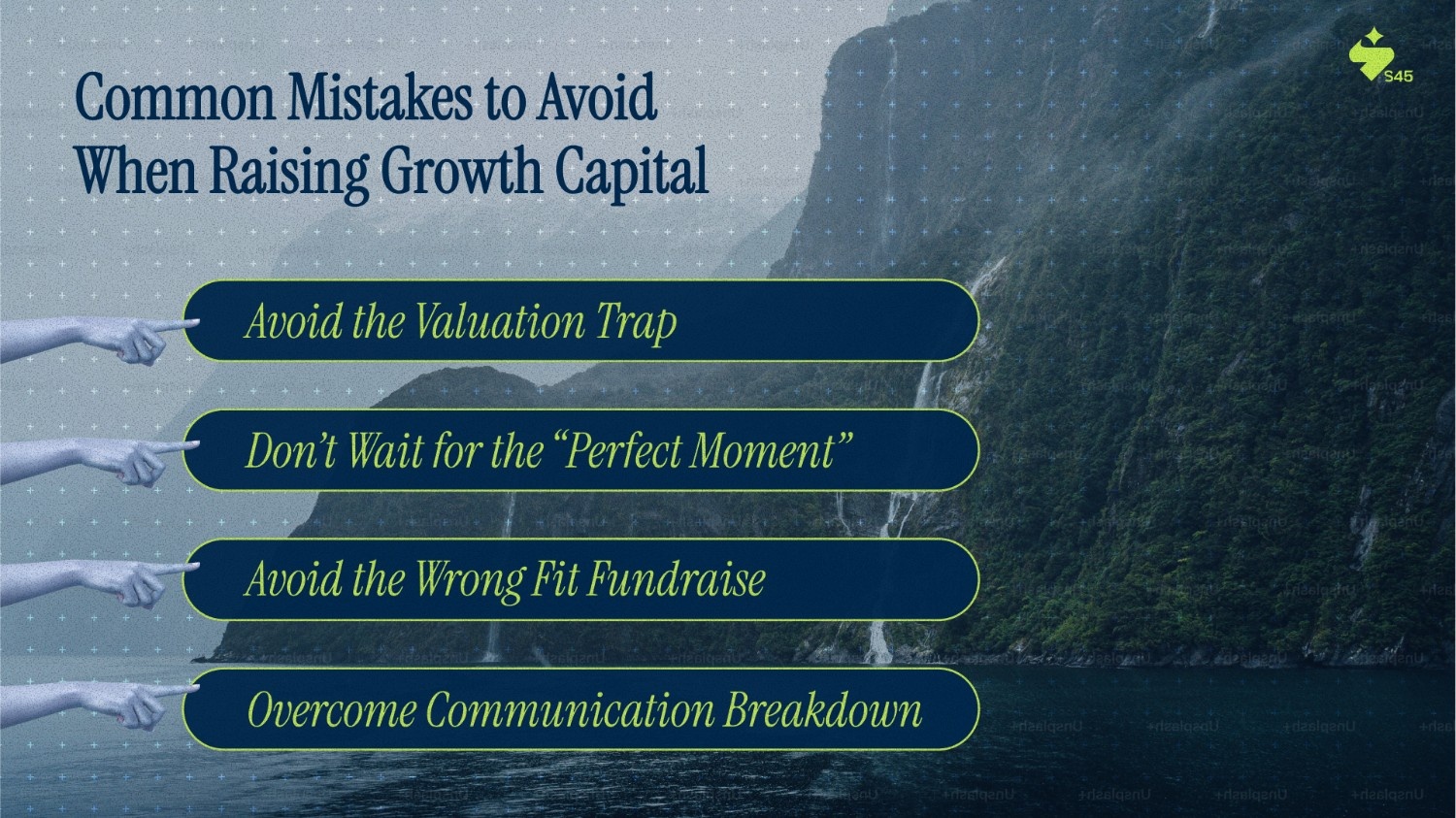
Key Takeaways
- Growth capital is funding used to expand or scale a business, typically for established businesses that are already generating revenue.
- It offers founders the opportunity to fuel innovation, enhance operations, or penetrate new markets without giving up control.
- For MSME founders, growth capital can unlock sustainable, long-term business growth while maintaining autonomy.
- It is typically raised through venture capital or private equity and can be used for marketing, product development, and talent acquisition.
- S45 partners with MSME founders to provide capital and expertise that drives sustainable business growth.
The MSME sector is a vital part of India’s economy, contributing 29% to the GDP and employing over 110 million people. However, a significant gap remains. Only 19% of MSME credit demand is met through formal channels, leaving a staggering ₹80 lakh crore unmet.
For founders like you, who have moved past survival mode but still need capital to scale, this presents both a challenge. Here, growth capital offers a strategic solution, funding tailored for businesses that have proven themselves but aren't yet at the scale required for traditional financing.
In this blog, we will discuss the features and applications of growth capital and how it can benefit you.
What is Growth Capital
Growth capital, also known as expansion capital or growth equity, is a type of funding specifically designed for companies that have proven their business model and are seeking to scale rapidly.
It involves investors that span a variety of both equity and debt sources, including private equity and late-stage venture capital funds, family offices, sovereign wealth funds, hedge funds, Business Development Companies (BDC), and mezzanine funds.
Growth capital targets companies that have:
- Established revenue streams (typically ₹10 crores+ annually)
- Positive or near-positive EBITDA
- Clear expansion opportunities
- Proven management teams
- Scalable business models
S45 partners with MSMEs ready to build lasting enterprises, offering both strategic capital and the operational wisdom that comes from years of building businesses alongside entrepreneurs like you.
Now, let’s see why growth capital is vital for MSMEs.
Why is Growth Capital Important for MSMEs?

For MSME founders, the main benefit of growth capital is that it enables founders to scale efficiently while minimizing the risks of taking on high levels of debt or losing control of the business. Let's break down what makes growth capital different:
1. Flexible Ownership Options
Growth capital offers a mix of debt and equity options, allowing you to decide how much control you want to keep.
- With debt-based funding, you maintain 100% ownership.
- Equity funding means giving up a small minority stake (usually 10-30%), but you retain control over your business. This flexibility is crucial for founders who have invested time and effort into building their businesses.
2. A True Partnership, Not Just Funding
Unlike traditional loans, growth capital providers don’t just give you money and leave you to handle the rest. They often become strategic partners, offering:
- Industry knowledge
- Market connections
- Guidance for navigating challenges
3. Focused on Growth, Not Just Survival
Growth capital is designed to fuel expansion, not just cover cash flow gaps or past debts. For busy founders, having experienced partners can speed up your growth and help avoid common pitfalls. It can be used to:
- Enter new markets
- Develop new products
- Scale infrastructure (tech, production, etc.)
- Make strategic acquisitions
- Strengthen your leadership team.
4. A Balanced Approach to Risk and Reward
Growth capital strikes a middle ground on risk. Your business is proven, but you’re not yet a large corporation with steady cash flow. This means:
- Lower risk compared to early-stage funding
- Higher growth potential than traditional loans
- Reasonable return expectations focused on sustainable growth, not quick returns
5. Repayment Terms That Fit Your Business
Growth capital provides flexible repayment options that align with your business’s cash flow:
- Payments tied to your seasonal cycles
- Revenue-based repayments, paying more when you earn more
- Balloon payments, due after significant business milestones
- Grace periods during expansion
- This flexibility ensures you can grow without the pressure of rigid repayment schedules.
Understanding how growth capital is important is one thing, but seeing how it can actually work and directly help your business grow is another.
How Growth Capital Can Be a Real Opportunity for MSMEs

There aren’t any theoretical strategies on how you can successfully use growth capital in your startup, but there are some practical ways that have built market leaders. Here’s how Indian MSMEs are using growth capital to scale:
- Expanding Into New Markets: Growth capital supports regional distribution, local partnerships, and marketing. For example, Blue Tokai used $25 million to expand across India and prepare for international markets.
- Investing in Technology and Going Digital: It enables tech investments like ERP systems, online stores, and supply chain automation without draining cash flow. This is key for traditional businesses going digital.
- Increasing Manufacturing Capacity and Automation: Growth capital helps upgrade equipment, expand facilities, and earn export certifications, providing the funds needed for long-term gains.
- Taking Control of Your Supply Chain: By using growth capital, businesses can acquire suppliers, set up in-house production, or establish direct distribution channels, improving profit margins.
- Expanding Into International Markets: It funds market entry, from certifications to international partnerships, helping MSMEs explore export opportunities, especially with government support.
- Acquiring Competitors or Complementary Businesses: Growth capital makes strategic acquisitions possible, helping businesses expand their customer base and bring in new technologies or teams.
- Supporting Working Capital Needs: It ensures MSMEs can scale inventory, manage accounts receivable, and fund large projects—directly supporting growth-related activities.
Once you've decided that growth capital is the right fit for your business, the next step is accessing it.
Growth Capital Eligibility: Is Your MSME Ready?
After years of building your business, you might wonder if it’s time to seek growth capital. The decision isn’t just about revenue; it’s about your business’s readiness to scale. Here’s how to honestly assess whether you’re prepared.
Financial Readiness: Stability Over Size
Your financial readiness means having stable revenue with clear explanations for any fluctuations.
- Aim for consistent annual revenue (₹2-25 crore).
- Focus on steady performance over the last 2-3 years.
- Ensure profitability trends are positive or on track.
- Have strong financial management and regular statements.
Operational Readiness: Can You Handle Growth?
Revenue growth won’t matter if your operations can’t scale. Growth capital providers want to see that your business can run without being overly dependent on the founder.
- Your operations should run smoothly without relying on the founder for everything.
- Make sure you have a proven business model, experienced management, and scalable systems.
- Avoid being overly dependent on a few key employees.
Growth Opportunity: Are You Positioned for Expansion?
Growth capital is for businesses with clear, actionable growth opportunities. This means addressing a large enough market and having a competitive edge that sets you apart.
- Have clear, actionable plans for market expansion.
- Ensure you have a competitive advantage and scalable infrastructure.
- Investors want specific strategies; vague ideas won’t cut it.
Compliance and Documentation: Ready for Institutional Investment
Growth capital comes with documentation and compliance standards.
- Be compliant with GST, labor laws, and industry regulations.
- Have proper business registration, audited financials, and tax compliance.
- Ensure legal agreements meet institutional investment standards.
At S45, we help founders prepare for growth capital. We work on strengthening your operational systems and financial documentation long before formal fundraising begins. Our approach isn’t just about evaluating; it’s about preparing for success.
By preparing early, you won’t have to scramble when growth opportunities arise. You’ll be ready to access the capital you need to scale your business.
While you're getting ready, avoid some common mistakes that many founders make in the fundraising process.
Common Mistakes to Avoid When Raising Growth Capital

Founders often make common mistakes while raising capital, which you should avoid. Here are key mistakes to steer clear of when raising growth capital, based on years of observing founders' journeys.
1. Avoid the Valuation Trap
- Mistake: Chasing the highest possible valuation.
- Why It’s a Problem: Unrealistic valuations can make it hard to close a deal. If you do get a high valuation, the pressure to deliver impossible returns can break your business.
- Tip: Focus on a fair valuation. A deal that closes quickly is better than one that never happens. Remember, it’s better to own a smaller part of a successful company than a big part of a failed one.
2. Don’t Wait for the “Perfect Moment”
- Mistake: Waiting for perfect conditions before raising capital (e.g., hitting revenue targets, securing a major client).
- Why It’s a Problem: The perfect moment may never come.
- Tip: Raise capital when you can tell a compelling story, not when everything is perfect. Investors want to back your future, not just your current success.
3. Avoid the Wrong Fit Fundraise
- Mistake: Taking money from anyone just to get capital.
- Why It’s a Problem: This can lead to a bad investor relationship that harms your business.
- Tip: Be selective. It's better to wait and find the right investor partner than rush into a relationship that doesn't align with your goals. Patience can lead to long-term success.
4. Overcome the Communication Breakdown
- Mistake: Going silent after securing funding and only communicating during board meetings.
- Why It’s a Problem: Investors want to help but can’t if they aren’t informed.
- Tip: Overcommunicate. Regular updates, even simple monthly emails about progress, challenges, and needs, keep investors aligned with your vision. They become allies, not judges, when problems arise.
By avoiding these mistakes, you can raise capital more effectively and build stronger relationships with investors. Avoiding common mistakes is just the start. A strategic partner like S45 has your back throughout the entire journey.
How Can S45 Help MSME Founders Access Growth Capital?
Whether you're expanding into new markets, upgrading technology infrastructure, or building competitive advantages through strategic investments, S45 offers growth capital solutions designed for Indian MSMEs ready to build lasting enterprises.
We provide:
1. Capital + Expertise: When you partner with us, you don’t just get the funds you need to scale. You also gain:
- Access to our extensive network
- Industry insights to guide your decisions
- Practical mentorship for sustainable growth
2. Sustainable Growth: We focus on long-term growth, not just quick wins. Our goal is to help you build a business that lasts. With our support, you get the right resources at the right time to scale at a steady pace.
3. Legacy Through Innovation: We believe innovation is key to creating lasting legacies. Whether you’re expanding your product offerings, entering new markets, or optimizing operations, we’re here to help turn your vision into reality.
Connect with us to discuss your expansion plans and discover partnership opportunities that align with your vision for sustainable scaling.
FAQs
Q: What is the minimum revenue requirement for growth capital eligibility?
A: Most growth capital providers seek MSMEs with annual revenues between ₹2-25 crore, though specific requirements vary by provider and industry. The focus is on revenue consistency and growth trajectory rather than absolute size.
Q: How does growth capital differ from traditional bank loans?
A: Growth capital offers more flexible repayment terms, doesn't always require collateral, and often includes strategic support beyond funding. Unlike fixed-payment bank loans, growth capital can align repayments with business cash flows and growth milestones.
Q: Can family businesses access growth capital without losing control?
A: Yes, growth capital providers typically take minority stakes (10-30%) or offer debt-based solutions that maintain family control. The focus is on partnership and growth acceleration rather than control acquisition.
Q: What sectors are most attractive for growth capital in India?
A: Manufacturing, technology services, consumer goods, healthcare, and export-oriented businesses show strong growth capital interest. However, any sector with scalable business models and market expansion opportunities can attract growth capital.


